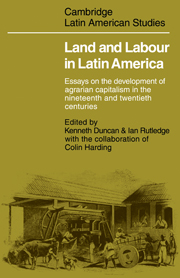 Land and Labour in Latin America
Land and Labour in Latin America Book contents
- Frontmatter
- Contents
- List of tables
- List of figures
- List of maps
- Acknowledgements
- 1 Introduction: patterns of agrarian capitalism in Latin America
- PART I THE TRANSITION FROM TRADITIONAL HACIENDA TO CAPITALIST ESTATE
- PART II THE DEVELOPMENT OF A PLANTATION ECONOMY WITH LABOUR RECRUITMENT FROM HIGHLAND PEASANT COMMUNITIES
- PART III THE DEVELOPMENT OF COMMERCIAL AGRICULTURE USING EUROPEAN IMMIGRANT LABOUR
- PART IV THE TRANSITION FROM SLAVE PLANTATION TO CAPITALIST PLANTATION
- 14 The consequences of modernization for Brazil's sugar plantations in the nineteenth century
- 15 From banguê to usina: social aspects of growth and modernization in the sugar industry of Pernambuco, Brazil, 1850–1920
- 16 The evolution of rural wage labour in the Cauca Valley of Colombia, 1700–1970
- 17 The post-emancipation origins of the relationships between the estates and the peasantry in Trinidad
- PART V POSTSCRIPT
- Glossary of Spanish and Portuguese terms used in the text
- Weights and measures
- Notes on contributors
- Indexes Subjects
- Authors
15 - From banguê to usina: social aspects of growth and modernization in the sugar industry of Pernambuco, Brazil, 1850–1920
Published online by Cambridge University Press: 07 May 2010
- Frontmatter
- Contents
- List of tables
- List of figures
- List of maps
- Acknowledgements
- 1 Introduction: patterns of agrarian capitalism in Latin America
- PART I THE TRANSITION FROM TRADITIONAL HACIENDA TO CAPITALIST ESTATE
- PART II THE DEVELOPMENT OF A PLANTATION ECONOMY WITH LABOUR RECRUITMENT FROM HIGHLAND PEASANT COMMUNITIES
- PART III THE DEVELOPMENT OF COMMERCIAL AGRICULTURE USING EUROPEAN IMMIGRANT LABOUR
- PART IV THE TRANSITION FROM SLAVE PLANTATION TO CAPITALIST PLANTATION
- 14 The consequences of modernization for Brazil's sugar plantations in the nineteenth century
- 15 From banguê to usina: social aspects of growth and modernization in the sugar industry of Pernambuco, Brazil, 1850–1920
- 16 The evolution of rural wage labour in the Cauca Valley of Colombia, 1700–1970
- 17 The post-emancipation origins of the relationships between the estates and the peasantry in Trinidad
- PART V POSTSCRIPT
- Glossary of Spanish and Portuguese terms used in the text
- Weights and measures
- Notes on contributors
- Indexes Subjects
- Authors
Summary
During the 1930s, the hostility between the central mill-owners of Pernambuco and their independent cane suppliers, which had been growing since the late nineteenth century, finally reached an acute stage. An outgrowth of this was a body of literature produced by a vigorous school of local writers, who sought to assess the impact on their society of the sugar economy's development over previous decades. Their main argument concerned the excessively high social cost of modernization and the urgent need to halt the destruction of the traditional fabric of the community which it was bringing about.
According to these defenders of the old order, a serious loss was entailed by the growth of the central mills, or usinas, because in the process they were swallowing up the smaller, old-fashioned plantations, known as banguês. This had the result of gradually uprooting the centuries-old class of planters who had presided from the beginning over the nation's destiny and who embodied all that was best in its character. Of no less importance, the usinas were accused of producing a deterioration both in labour relations and in the standard of living of the rural population. The rural labourer, it was claimed, had become a pariah of the usina. Finally, the critique that attempted to vindicate the old engenhos found itself obliged in turn to defend the slave labour system with which they had been identified from the earliest times. Here it was the familiar argument that plantation slaves were often materially better off than their free counterparts locally, or than the proletariat of contemporary industrialized societies.
- Type
- Chapter
- Information
- Land and Labour in Latin AmericaEssays on the Development of Agrarian Capitalism in the nineteenth and twentieth centuries, pp. 369 - 396Publisher: Cambridge University PressPrint publication year: 1978
- 1
- Cited by


